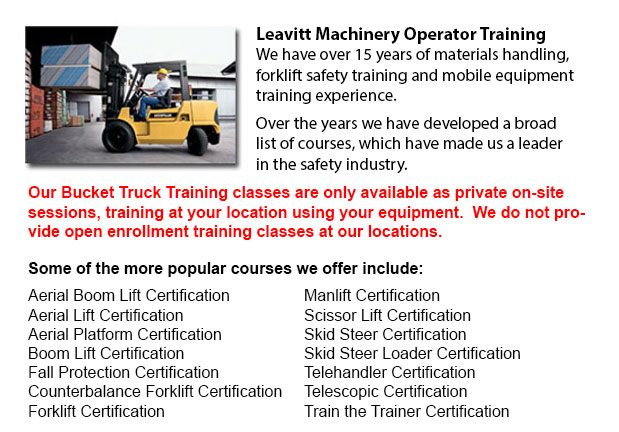
Bucket Truck Training Richmond Hill - The bucket truck training program is a program which is intended to effectively train qualified operators so they can reduce the chance of incident and personal injury when working in close proximity to or with bucket trucks or also referred to as vehicle-mounted aerial work platform. An aerial lift device is any vehicle-mounted device, articulating or telescoping, or both, which is used to position employees to reach spots which would otherwise be unreachable. Aerial lift devices are used to be able to elevate personnel to above-ground work locations.
The goal of the program is to provide operators with the skills, knowledge, abilities, and training materials needed in order to learn to operate vehicle-mounted aerial work platforms effectively and safely.
The program consists of a hands-on training session and a classroom training session. To become certified, participants have to be successful in both parts. A wallet-size certificate and a full-size certificate would be issued upon finishing the program.
The kinds of lifts examined in the program comprise Aerial lift devices are normally made of wood, metal, reinforced plastic, fiberglass or other materials.
Definitions
Articulating boom platform: has two or more hinged boom sections.
Extensible boom platform: has a telescopic or extensible boom.
Platform: section of the aerial device that is designed to carry employees.
Mobile unit: a combination of aerial devices, like for instance its vehicle and related machine.
Employers have the responsibility to make certain their employee acquire correct training prior to operating aerial devices. Employees must make sure they likewise acquire the needed training and that they do not operate lift devices if they are not authorized to do so. Workers should make certain that they are wearing the correct protective equipment if working from the platform.
The course content used in the bucket truck training program comprises the operation of the vehicle-mounted aerial work platform, pre-shift inspections, safe operating practices, lifting capacity, use of emergency controls, and administering practical and theory tests. Operators would know legal requirements under the local and federal regulations.
-
Scissor Lift Certification Richmond Hill
Scissor Lift Certification Richmond Hill - Scissor lift platforms are utilized at work sites in order to allow tradespeople - like for example welders, masons and iron workers - to reach their work. Operating a scissor lift platform is usually second... More -
Narrow Aisle Forklift / Order Picker Training / Electric Pallet Jack / Electric Pallet Truck Training in Richmond Hill
A pallet jack is a model of equipment specialized in the transporting of pallets of many dimensions and weights. They might be utilized as an appendage for lift trucks, cranes and other types of heavy machinery or be used on their own. Pallet jacks a... More -
Heavy Equipment Operator Certification Richmond Hill
Heavy Equipment Operator Certification Richmond Hill - The heavy equipment operator is a person who manipulates the controls and drives various kinds of big machinery. Heavy machinery is most frequently used on construction sites in order to deliver... More -
Loader Training Richmond Hill
Loader Training Richmond Hill - Why You Must Finish A Loader Training Course - Individuals wanting work in businesses that use lift trucks must undergo a Loader Training program prior to becoming a certified operator of a lift truck. There are lots o... More -
Manlift Training Richmond Hill
Manlift Training Richmond Hill - Various manlift training programs consist of the review and content of manlift devices. An important part of the course is the practicum where students show their knowledge and practical ability to safely operate a ma... More -
Fall Protection Training in Richmond Hill
There are many injuries at work associated to falling and a lot of fall-related deaths reported every year. Most of these instances could have been prevented with better training, better measures in place, and by correctly equipping personnel before... More -
Wheel Loader Training Richmond Hill
Wheel Loader Training Richmond Hill - Commonly, the various kinds of heavy equipment training are classed into 2 categories of machinery: those which have rubber tires and tracked vehicles. Tracked vehicles consist of items like cranes, bulldozers an... More -
Forklift Certification Schools Richmond Hill
Forklift Certification Schools Richmond Hill - Forklift Certification is mandatory in North America. Hence, forklift training programs are important both for companies and for people seeking jobs in industries as forklift operators. Forklift training... More

Forklift Training Richmond Hill
TOLL FREE: 1-888-254-6157
Richmond Hill, Ontario
forklifttrainingrichmondhill.com
Email Us
About Us


